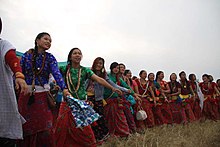Sunuwar people

Kirati Sunuwar
|
|
| Total population | |
|---|---|
| Approximately 100,000 (2012 estimation) | |
| Languages | |
| Sunuwar, Nepali | |
| Religion | |
|
Predominantly Kiranti, Hinduism, Buddhism |
Predominantly Kiranti, Hinduism, Buddhism
The Sunuwar(Nepali: ) are one of the indigenous peoples of Nepal and some areas in India. The majority of this tribe follow the Kirant religion and adopt the Mundhum (Kiranti) culture. They speak the Sunuwar language. However, some population of this tribe is influenced by the Hinduism and Christianity also. According to the 2001 census, only 17.4% were Kirant.
The Kiranti-Kõinchs number 96,254. The term ‘Kõinchs’ is also the name of the mother tongue. Other terms like Mukhiya or Mukhia are exonyms of the tribe. There is another common teasing name (mainly given by outsiders) of the tribe coined from the Sunuwar language itself, e.g. Maaraapaache (lexically maar ‘what’ and patsaa ‘to do’, from when the speakers ask themselves maar patsaa? at the time trouble). Sunuwar have their distinct language, religion, culture and social customs.
They inhabit the eastern hills of Nepal. They are autochthonous to the Molung Khola, Likhu Khola and Khimti Khola (‘Khola’ Indo-Aryan Nepali etymon ‘rivulet’). By administrative division, they dwell in Okhaldhunga, Ramechhap and Dolakha districts of Nepal, politically known as Wallo (‘Near/Hither’) Kirant (in the past and also in use among the Kirantis at present) after the fall of the Kirant dynasty (ruling for about 1903 years and 8 months) at the ancient Nepal valley. Wallo Kirant in the past was their Kipat or communal land. Their migration (mainly to the east) later took place in several parts of the country in Jhapa, Ilam, Panchthar, Taplejung, Terathum, Sunsari, Sindhuli, Kathmandu and other districts and abroad in Darjeeling, Sikkim, Japan, Bhutan, South Korea, Japan, the United Kingdom, the United States, and Canada.
...
Wikipedia
